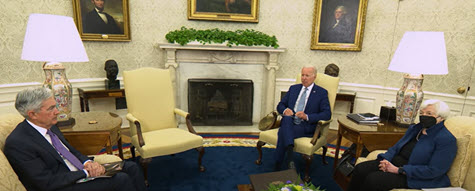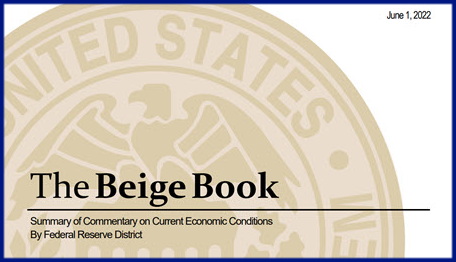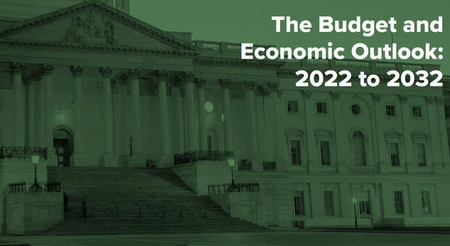
President Joe Biden affirmed this week that the Federal Reserve will take the lead role in his administration’s efforts to tame inflation. The Fed’s “Beige Book” of regional economic surveys also confirmed the economy is facing headwinds of high inflation, supply chain issues and labor market difficulties. (Barron’s, May 31 and MarketWatch, June 1)
Top Economic Priority
- Biden announced a three-pronged plan to fight inflation as his “top economic priority” in a May 30 Wall Street Journal op-ed, where he noted the Fed will have the primary responsibility to control rising prices.
- Biden stated his second goal is to push Congress to act on cost-reduction measures such as clean energy tax credits and a Housing Supply Action Plan recently proposed by the administration. Lastly, he listed that Congress must act to reduce the federal deficit, citing a May 25 report by the Congressional Budget Office. (CBO Budget and Economic Outlook: 2022 to 2032).
- Federal Reserve Chair Jay Powell and Treasury Secretary Janet Yellen also met with President Biden this week (see photo with video link, above) to reiterate their “laser focus on addressing inflation.” Biden remarked, “With a larger complement of [Federal Reserve] board members now confirmed, I know we’ll use those tools of monetary policy to address the rising prices for the American people.” (White House remarks and video, May 31)
- The next meeting of the Federal Open Market Committee is June 14-15, when it is expected that the Fed’s benchmark interest rate will be increased by half a percentage point. (AP, May 25)
- The White House previously announced plans to combat inflation on May 10 that included proposals to increase taxes on large corporations and the wealthiest Americans – and possibly eliminate Trump-era tariffs on foreign imports. (White House Inflation Plan | News conference video | The Hill, May 10)
Beige Book & Sentiment Index

- In the Fed’s June 1 “Beige Book,” the majority of the twelve Federal Reserve Districts reported slight or modest growth. Survey respondents cited labor market difficulties as their greatest challenge, followed by supply chain disruptions. Rising interest rates, general inflation, the Russian invasion of Ukraine, and disruptions from COVID-19 cases (especially in the Northeast) round out key concerns impacting household and business plans, according to the Fed’s surveys.
- Roundtable President and CEO Jeffrey DeBoer commented on similar findings in The Real Estate Roundtable’s Q2 2022 Economic Sentiment Index. “Our Q2 Sentiment Index reveals bright spots for lease demand in a wide swath of the economy, particularly regarding life sciences, industrial, multifamily, and data center assets. At the same time however, high inflation, rising interest rates, labor and supply chain shortages are increasing costs associated with all real estate development and operations. The impact of ongoing war in eastern Europe is another cloud tempering optimism.”
- He added, “We urge national policymakers to focus on creating jobs and supporting strong real estate asset values. Both actions would buttress the overall economy and help local community budgets provide needed safety, education and transportation services.” (Roundtable news release, May 13)
CBO Projections

- The CBO’s May 25 Budget and Economic Outlook noted that although the deficit is projected to fall to about $1 trillion — or 4.2 percent of GDP — in the current fiscal year from almost $2.8 trillion last year, demographic pressures and other factors will push deficits steadily higher in later years.
- These pressures on the federal deficit could have an impact on the prospect for legislation addressing “tax extenders” later this year during a post-election, congressional “lame duck” session.
Inflation, interest rates and other economic conditions will be a focus of discussion during The Roundtable’s Annual Meeting on June 16-17 in Washington, DC (all member meeting).
# # #
